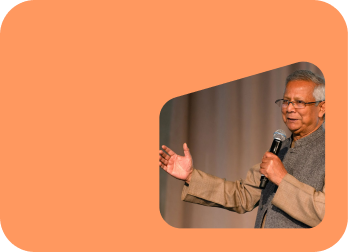|
1. Why Grameen Shakti?
Global warming is an on-going over-riding issue in Bangladesh. So is the shortage of power. There is hardly any electricity in the rural areas. Eighty per cent of people of Bangladesh live in the rural areas. Seventy percent of the population of Bangladesh has no access to electricity. I thought it gives us an opportunity to bring renewable energy to Bangladesh. But it was not easy, because the price of solar panel per watt was too high; it was not affordable to villagers. In addition, high costs are involved in installing solar panels in village homes. At one point, I thought I should start experimenting with it even if it is too expensive. Maybe someday, the price of solar panel will come down; and it will become affordable.
I contacted Rockefeller Brothers Fund (RBF) in January, 1995. They responded very warmly to help us experiment with the acceptability of solar home system. I went to the USA the same month and met them. Following up on our discussion RBF wrote to Mr. Neville Williams, Chairman, Solar Electric Light Fund (SELF) explaining my interest in experimenting with solar home systems in a sustainable way. Mr. Williams connected me to Solar Power Light Company Ltd (Sri Lanka) and Lotus Energy (Nepal).
After discussion with Sri Lanka and Nepal we worked out an action plan. Solar Power Light company will provide us the solar panel, Lotus Energy company will give us the accessories, Rahim Afroz of Dhaka will supply us the battery. Grameen Shakti will install 20 solar home systems under this agreement. The total cost of $ 16,700 was to be funded by RBF.
This was the beginning of Grameen Shakti. In the next phase we expanded our programme to 100 solar home systems in 1995. Shameem Anowar, who was the head of Technology Department of Grameen Bank, became the contact person for all our negotiations and activities. Khalid Shams, the Deputy Managing Director of Grameen Bank was leading the Grameen team.
For marketing the first 100 units we came up with the following options :
Each solar home system will cost Tk. 20,000
Option 1 Total amount to be paid on installation of the system.
Option 2 Total amount to be repaid in five years in monthly installments of Tk. 300, with a down payment of Tk. 5,000.
Option 3 To be repaid in monthly installment of Tk. 400, or in weekly installments of Tk. 93.
By March 1996 Grameen Shakti started to implement the programme with great enthusiasm. RBF provided $ 75,000, Stichting Gilles of Belgium provided $ 40,000.
Dr. Farashuddin joined as an Advisor to Grameen Shakti in October, 1995. Dr. Farashuddin just came back from abroad after retiring from his service in the UNDP. I gave the responsibilities to him to oversee the project. He was supported by Engineer Ruhul Quddus who provided the technological know-how to the project.
The solar home system experiment excited me. For the first time I started to feel that this can be done. This is not impossible at all. We need to focus on it as a consumer product. People need it, we can provide it in an affordable way. With the confidence I gained from the experiment I wanted to proceed in a more systematic way. Dewan Alamgir was appointed as a consultant to write project documents. Whenever we talked to the energy experts about our project, they would advise me to do more research. I kept saying that I am not a researcher, I am a seller of a product. I want to make it a popular product. That's how I'll design everything. Soon I found out that our product was gaining popularity. Rural people started to pay attention to our product.
By 1996 I felt that it was time to convert the project as a not-for-profit company. Since Dr. Farashuddin was leaving I put Dipal Chandra Barua's (General Manager, Grameen Bank) name on company's memorandum of association as the Managing Director of Grameen Shakti. This was done as a stop-gap arrangement until I could find a full time Managing Director, Usually I put Khalid Sham's (Deputy Managing Director, Grameen Bank) name for such appointments. Since his hands were full, this time I gave it to Dipal.
2. Were you happy with the response you got?
Yes, I was. I felt very encouraged. We developed the product and made it attractive to our potential customers. However, maintenance became an important issue. We found a great solution to it by giving the responsibility to young village girls with some schooling and gave them an attractive name - Solar Engineers. They loved it and became proud of it. We have installed over 365,000 SHS in Bangladesh and we hope to reach a million SHS by 2013. We are selling 20,000 SHS per month in 2010.
3. How does it make a difference in the context of Global Warming? It is such a tiny effort.
This might be a small effort in terms of global warming. We have developed the seed in Bangladesh and this seed can be planted everywhere in the world. If the costs of the panel are reduced, more and more people will switch to solar system for sure. If the cost comes down to $ 1.50 per watt, the panels would be extremely popular. I think the whole of Bangladesh will go for solar home system. Demand for SHS is in a steady growth even with the price of almost $ 3 per watt.
4. Is it replicable?
Of course it is! We can use solar energy for all our household needs. It works for individuals. It works for community. Households can actually become producers of electricity for the national grid. This can become extra source of income. This can work anywhere, in Bangladesh, or any other country.
5. Why isn't it spreading like Microcredit did?
Microcredit took time to spread. We started microcredit in 1976. The first replication came in 1982. By 2010, it became a global phenomenon. Grameen Shakti was born in 1996. Initial growth is always slow. Then it picks up speed. Grameen Shakti has all the elements of success. All new concepts and methods must be tried and tested before they gain huge momentum.
6. Will it always remain dependent on foreign suppliers who will make money for themselves?
If the market grows internally, I’m sure it will be possible for the panels to be produced locally. Bangladesh can produce its own panels. Chemical based technology would be a cheaper alternative to the existing, silicon-based technology. We are waiting for that. We want to create social business to produce solar panel. We are discussing with a German company to produce solar panels in Bangladesh.
7. How can social business help spread the use of solar energy?
Social business can play two roles: producing the solar panels and installing the SHSs. Social business is an important addition to traditional capitalism. In social business, there is no intention to make personal profit. SHSs can be installed at a cheaper price as a social business. Social business is the most effective way to spread renewable energy.
8. When will it really take off?
It has already taken off. Big momentum.
Important technological breakthroughs in producing solar panels will allow mass production locally. It will boost sales, usage, and make solar energy a product of mass consumption. Social businesses with the objective of popularizing solar energy will hasten the speed of its growth.
9. What is the management structure of Grameen Shakti like and how has it improved over the last 15 years?
The management structure at Grameen Shakti is virtually the same as the one within Grameen Bank. There’s a head office in Dhaka, 12 Divisional offices, 117 regional offices and 840 branch offices. The branch offices are the most important entities because that’s where the actual contacts with the households are maintained. Other higher level offices are for keeping the supply line fully primed, offer any assistance to the branches, plan and monitor the expansion and quality of service.
10. Were there any obstacles in the early days of Grameen Shakti? How did you overcome them?
The price was the main obstacle but we overcame that problem by allowing customers to pay for their solar panels over 2 to 3 years in monthly installments. If the customers are not satisfied with the product, they can return their SHSs and they will not be required to pay monthly installments any more. They can enjoy the panels for as long as they pay the monthly installments. People found it very attractive offer. Very few customers in reality actually returned their SHSs. Once electricity enters your house it is impossible to get it out of your life again.
11. Will you remain focused on Solar? What about other renewable sources ?
We are not focused on solar. Solar, wind, and bio-gas are all sources of renewable energy which we are deeply involved with in Bangladesh.
Both our bio-gas plant and Improved Cooking Stove (ICS) programmes are growing fast. By March, 2010 we have installed almost 11,000 bio-gas plants. Each month we are adding 550 bio-gas plants. By 2012 we expect to install 50,000 bio-gas plants.
Fuel-saving ICS are also growing at a fast speed. We add 20,000 ICSs per month. By 2011 our plan is to have 400,000 ICS in rural homes. Our first million ICS will be installed by December, 2013.
We are continuously looking for more ways to produce green energy. We are also focusing on hydrogen fuel-cell. Soon we hope to produce hydrogen fuel-cell based electricity for the rural poor. We have the technology; we are looking for the investors. As soon as financing can be arranged we can go for production and marketing.
12. Can renewable energy play a significant role in the economy?
I see an enormous possibility. But cost factor will be the deciding factor. The world needs to put a great emphasis on the research to make the technology cheaper and more efficient. If this is done, the goal can be achieved.
13. What will happen ten years from now?
With the terrible crisis of global warming getting more serious every day I think in ten years a dramatic change will have to come in converting the economies from fossil-fuel-based power to renewable energy. We are preparing the ground for it. We are playing the role of being the facilitator of that massive change-over.
Pursuing the COP15 conference, more research can be done to find cheaper, sustainable energy sources. Time is running out. We'll have to move faster and faster. I hope within 10 year renewable energy will become the norm in Bangladesh, and in the rest of the world. Technological advances along with lowered prices will put fossil fuels in the declining phase, and make renewable energy the power source of the future.
Source - http://www.gshakti.org/index.php?option=com_content&view=article&id=119&Itemid=121;
|




 SOCIAL BUSINESS
SOCIAL BUSINESS 

 Events
Events News
News

